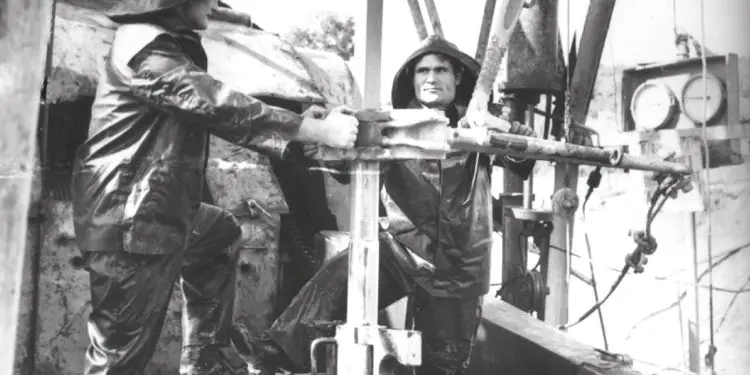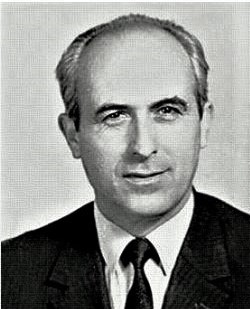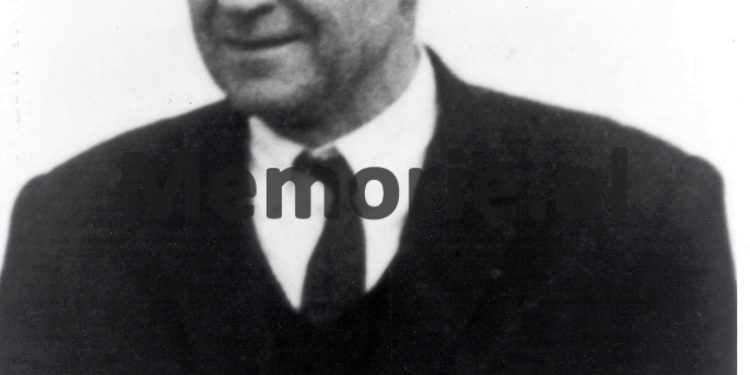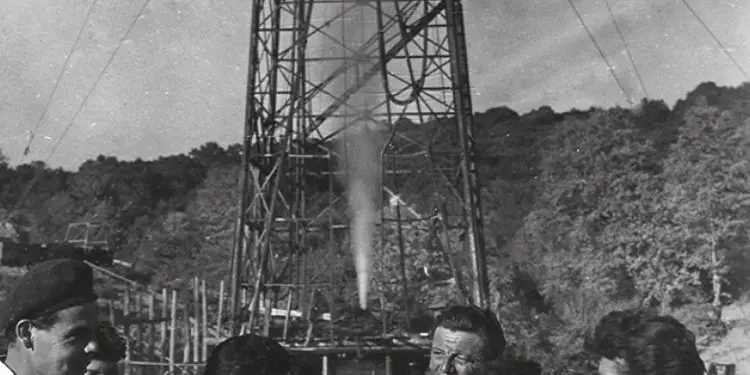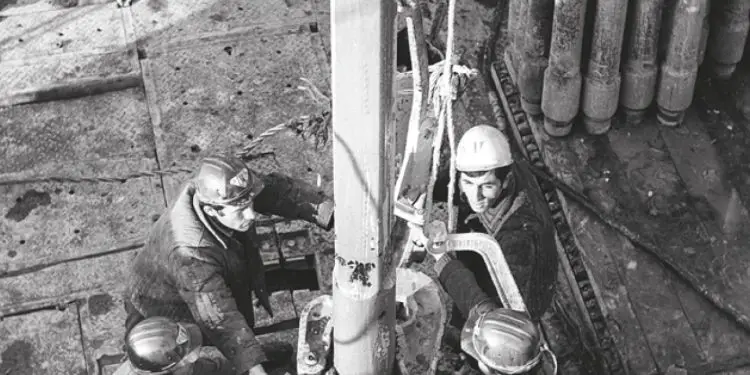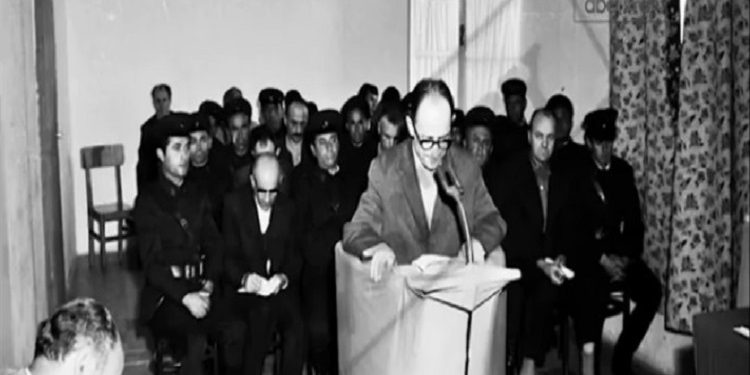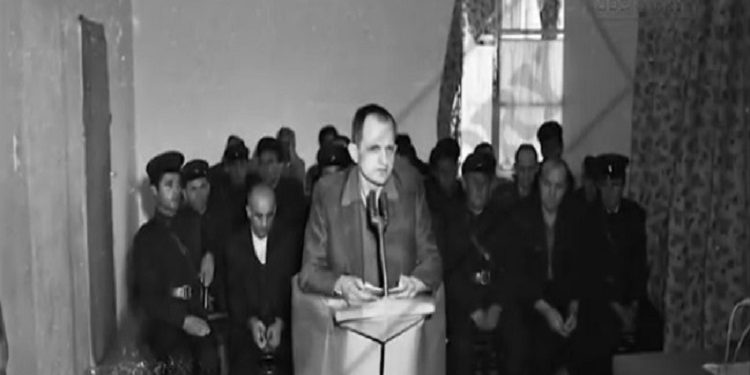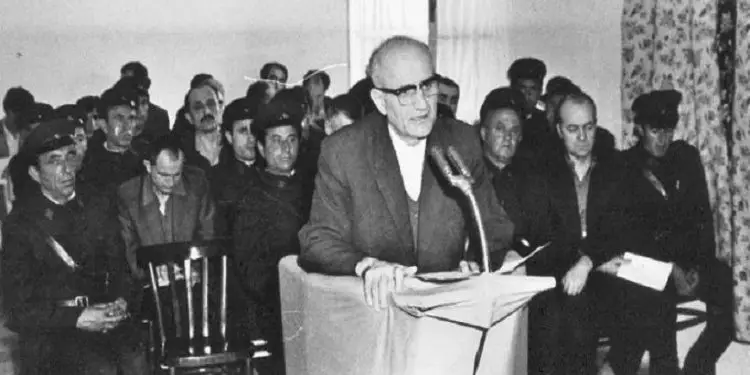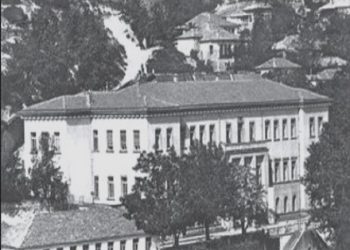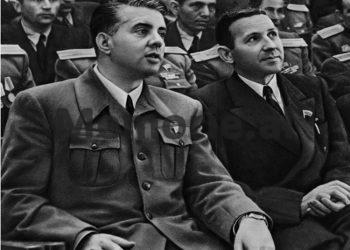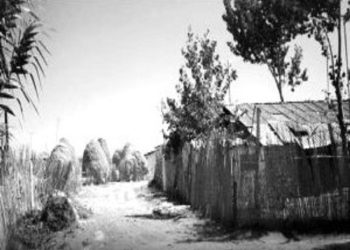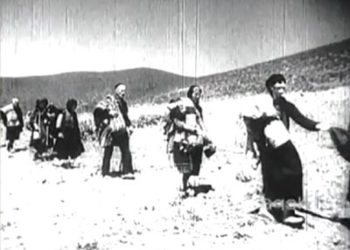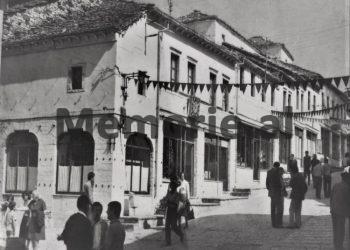By Petraq Xhaçka
Part eight
Memorie.al / The purpose of this book is to join the efforts made to present the truths and horrors of the communist dictatorship in Albania. The main purpose of the book is not to show our people or anyone else, that we oilmen have been innocent, because this has become known from publications in our press, from foreign televisions, as well as from direct meetings with the International Forum and the Albanian Human Rights. The author’s desire, is that through this story, together with other stories, fight any manifestation in any form, even moderate, that he may have to create a communist society. I think that even through this bitter personal history, the cruel, treacherous and overbearing face of Enverism will appear, that for half a century, held the knife with the tip in the chest of the Albanian people, with a pine eye, intercepting the movements for salvation from the outside, or rebellion of the people themselves, ready to push the knife to the heart, at the first movement. The events are set in the economic fields where it has appeared most strongly, such as the oil and gas industry, where I was fortunate to pour my energies, for a lifetime, and become a participant and witness in those events. All the events that are written in this memoir are true, not only without any exaggeration or embellishment, but perhaps, I don’t know how much I was able to present the terrifying force of the events that took place in that decadent system of socialism, where no there was no human feeling.
Continues from last issue
Honey years
Teams of specialists working on the generalization of geological materials and the design of new drilling wells for oil and gas exploration were supported by several groups of geologists. The latter carried out field geological surveys, for the drawing up of geological maps, the basis for design studies. They were necessary for the geological conditions in our country, where there are a great variety of geological formations. At the same time, geophysical studies were used, the level of which in those years was very low, due to the Soviet apparatus, an old technology.
Thus, the quality of the information of geological structural construction, coming from the depths of the earth, is quite poor. This made the responsibility of research and design work even more difficult and required deeper technical-scientific knowledge. The determinations of paleontological and petrographic studies proceeded with satisfactory steps, which have given a great help in raising the level of maps and geological studies both in the field and in the drilling wells. This was the main complexity of the studies contributing to the first years of the 1960-1970 periods.
Some of the main geologists working then in the generalization process were Koço Plaku, Thanas Nasto, Protoko Murati and later others joined. I cannot fail to emphasize that Koço Plaku was a geologist with a good scientific preparation and a sufficient experience in that period. He worked devotedly for geology and for many years we worked together in oil research, his studies were generally characterized by a commendable scientific level. Of course, as for him and for other geologists around the world, it cannot be demanded that every study always turns out with the desired success.
Geological knowledge of the underground can never be complete, because this science itself is not absolutely accurate. It deals with the possibilities that exist and everywhere the success rate is known, in the results of exploration wells for new areas. Especially the research work in the rather convoluted structure of the geology of our country, where the surface construction hides and does not directly reflect the construction in depth, this task became even more difficult. So every geologist, especially in our conditions of the relentless pressure of the party and the government, to drill and search more than the reasonable opinion of the specialists, rather blurred the level of success, and otherwise he would have, as conclusion, drilling wells with results, i.e. positive, and wells without results, which are called negative.
But it was always important that this coefficient of research work, both among geologist Koço Plaku and among Albanian geologists as a whole, was at a satisfactory level and, according to literature data. So we had one of the highest coefficients in all European countries and many countries on other continents. Koçoja made a significant contribution to the debates and discussions that took place, especially towards some geologists who allowed mistakes, or lack of scientific depth in their generalizations.
As a result, they were forced to rework the conclusions drawn. Some specialists among them, sick of Seder, tried to smear Koço’s positive contribution with mud, linking it to the harsh tone that the late Koço used in some cases, to these mistakes. So they didn’t look at the work, but the guna, as a popular saying says. Of course, during the work we also had debates and different opinions about geological problems, but for this entire period, he remains a respected specialist.
One day from the gloomy days of life under the dictatorship, Koço Plaku, among a group of other specialists, was declared an “enemy and saboteur of popular power”, just like some others before him, and with others after him. The dictatorial regime put us in front of the wild alternative, or to condemn their “mistakes”, such as; “Grievous crimes and sabotage,” or else we would show nothing but that we were their accomplices. No one could come to the defense of Koço, Beqir, Protokos, Dhimitri and others.
The days and conditions of freedom we have today show our attitude in those meetings a thousand times worse than it seemed to us then. The punishment of our colleagues remains as an undigested relic of a time when she asked we to be heroes and we were nothing but living beings, who counted and hoped to sleep peacefully saying that we could not save our friends, but at least we could save ourselves families, children, tribe and dozens of other factors that made up the panties of unmanliness.
We leading geologists were constantly under great pressure from the state leaders, as well as the oil party or district committees, who unfoundedly and without the slightest competence in geological matters and oil exploration, demanded to discover as soon as possible and as many new oil and gas fields as possible. But a design study lasted several months, and then a lot of time was needed for the phases of discussion and approval of the projects in various instances up to the ministry, and after that came the drilling phases, which often had their own problems.
The Soviet specialists, who had conducted studies in recent years at the geological enterprise of Vlora, at the time of their departure, did not leave us perspective studies, even short-term, for well designs with encouraging data for the new areas. The wells designed for oil and gas research had given positive results only in the discovery of Marinza and the expansion of reserves in the Patos field.
After all, some wells drilled for oil exploration in limestone rocks have given completely negative results. As an immediate consequence, a wrong opinion was formed, that limestones no longer present a perspective for further research in Albania.
We created as a working practice, that for each design, for each research or study design program, we would discuss them together with a friendly spirit and concern. Of course, not everyone had the same preoccupation and seriousness of work, as they did not have the same level of qualification, but this form helped to reduce or eliminate flaws or subjectivisms in the interpretations of geological phenomena, which for our difficult conditions, such as we emphasized above, they were more likely. But I want to emphasize one thing that all the difficult or unclear problems that arose were openly stated in the study-design reports, so that everyone could judge them objectively and give their opinion.
This confrontation of controversial moments, done openly, did not allow it to pass without being understood, even if someone wanted to do bad work. So these brainstorming, checks and numerous confrontations, which we carried out during the study phase of his defense, removed the opportunity for anyone to distort the truth or – to say that disgusting word so typical in the dramatic history of oil, – to sabotage you. The presence of negative wells in oil and gas exploration, anywhere in the world, is an inevitable, acceptable and objective companion.
Thus, the first two years 1961-62, we had good results in expanding the contours of the Patos and Marinza wells, in the north-western area, while the few wells we drilled in new areas had negative results. From a part of geologists, who worked on these designs, from the debates based on the knowledge we had and intensive studies of the literature, contrary to the conclusions of the Soviet specialists, the thesis and the idea of the limestone perspective were supported. Therefore we resumed research in those structures.
From our side, a bold decision was reached to search for oil in the so-called beds of; “Dependent type”, which are quite specific and difficult to support and argue their point. Thus, from our side, it was judged and decided to research in the area of Visoka, in the structure of limestones, which in the peak part was washed by fresh underground waters, with an intense circulation of them, which some geologists have , did not find support.
Although Elder Koço did not agree to the research in this area, I commissioned him to do the study. He finished it with good quality in terms of the geological picture, but he looked at it with disbelief. Here the opposing opinions held by other geologists weighed heavily. But disbelief is part of the professional conscience, and it cannot be used as a basis for reprimanding him or worse, for describing the geologist as a bad attitude. The case was really encountered as a rare phenomenon even in world literature. In conclusion, in the Scientific Council, with a majority of votes, including that of the author of the project, the designed well “Visoka 1” was not approved. We remained in the difficult position of the minority.
So the directorate and I, who were in two capacities, as; Chief Research Geologist and as the chairman of the Scientific Council, we were of the opinion that the well should be drilled, contrary to the majority of the members of the Council. The Ministry relied on our opinion, the minority, and unreservedly supported the drilling of the well. By the early summer of 1963, the drilling of the well came to an end. It was immediately transferred to the acquisition and it gave us very viscous oil, but with quite good industrial rates, for our country, thus marking the discovery of an important new resource, which was later followed by the drilling of wells others.
Our joy was very great, immense. We all felt not only the satisfaction of a success of our work as geologists, but also a relief from the unbearable atmosphere that had surrounded us all our lives. Ah, those heavy expressions of doubt and disbelief, which once in two days came down to us from the state pyramid and, from other oil workers, who knew nothing else but to talk about the “unsatisfactory situation in oil exploration and of gas”.
This case caused a sensation and Enver Hoxha got up and came to Kuçovo. There, in the Palace of Culture of this city of workers, he held a meeting with all oil geologists and industry leaders. It was the first time I was close to Enver Hoxha and met him in a meeting. He praised this discovery as a victory for Albanian geologists, a victory with the underground and with the thoughts of Soviet specialists. The first of the country, said among other things that; it was an extremely important success of the work of geologists, which constituted an extraordinary contribution to the economy of our country, in those difficult situations.
The head of the country mentioned my name and appreciated my direction of work. After this long meeting, accompanied by other leaders, he went to Patos, to see with his own eyes, the well that produced oil. They also asked us, a group of geologists, to come with them. The atmosphere of a beautiful sunny day was joyful and hundreds of pictures were taken. Enver Hoxha never stopped laughing. He seemed to be in a good mood, cracking friendly jokes in all directions. When he was stirring the thick oil of the well with a stick, he said to me:
– Come on, Xhaçka, let’s paint our faces with the new oil that you young Albanian geologists, with skill and courage, gave to the homeland! Until that time, oil in Albania was extracted only from sandstones. The discovery of the source in Visokë was extremely important, because it confirmed the prospect of limestone rocks, for the presence of oil and gas deposits.
Encouraged by this discovery, we petroleum geologists, particularly in the generalization group, began to discuss and study more widely other possible regions for limestone exploration. Rightly, we evaluated the research in the anticlinal structures of limestones, covered by silty deposits (combination of clays and sandstones) as the first rank, while the structures for hanging type beds like in Visokë, of the second rank category.
In these discussions, Koço Plaku, who had worked in the area of Vlora, proposed to carry out additional geological field work, and then generalization work, to see the possibility of designing in the Gorishti area, for which we all agreed. I again assigned this design task to Koço, who did a wonderful job with this second well as well. In 1965, the source-place of Gorishti was discovered, a source-place with satisfactory reserves, and especially with a fine oil of very good quality.
The discovery of the oil and gas source in Gorisht was another great victory for geologists, achieved in a short time, for the concrete possibilities, especially territorial of our country. Within two years, two important sources were discovered oil, which was not achieved decades before, even by foreign companies.
Especially for these two very important results for the economy of our country, for the increase in the well-being of the people, who, as a result of the policy of the communist leadership, were going through very difficult periods, working and living in a terrible isolation, a part of geologists who had contributed with their work, were decorated by the Presidium of the People’s Assembly, with various work orders and medals. We decorated ourselves; me, Koço Plaku, Protoko Murati, and many others.
Koço and I were given scientific degrees; Candidate of Geological Sciences and honorary scientific titles, Senior Scientific Associate. We became the first senior specialists of the oil industry, with scientific titles.
With these two discoveries, in addition to previously discovered deposits, the oil industry opened a much wider front for drilling wells for oil exploration and extraction. In that wave of enthusiasm, petroleum geologists drilled exploration wells north of Marinza, which led to the discovery of new oil and gas deposits. As a result of these discoveries in the community and with Marinza, it became possible for oil production in the years 1971-’73 to reach levels nearly five-six times higher, from those places-resources that were known before.
The production volume reached about 2.3 million tons per year. It became possible to extract industrial gas for the first time, from new natural gas sources. This level of production was higher than in some large countries, which had long developed extensive research works, such as; in Italy, France, Hungary, and Bulgaria he found it. In Europe, we were firmly in third place, for production per capita, behind the Soviet Union and Romania.
In these years of intensive work for us geologists, in addition to some people who entered the competences of geologists without knowing this science, but rather to “leave the baton” of responsibility, as it was said among oilmen, there were old specialists, such as; Rexhep Reka, Eqerem Beci, Bekim Sinoimeri, and others, who created very good and warm relations with us geologists, understood well the limits of our activity, and did not interfere with the competences of geologists.
I have had the opportunity to work with these specialists and managers for many years and I remember them with respect for their work and human relationships, cultured as well as their skills in the field of oil extraction and well drilling. The sense of sacrifice at work, to the display of heroism in extinguishing the fountains, has been very characteristic performances for oilmen. The workers, technicians and engineers, have gone through great difficulties and skillfully solved many important problems.
It is worth mentioning some of the Labor Heroes, or distinguished employees, with whom my work has connected me and I have had good relations, who with ingenuity and piety, have extinguished powerful oil and gas fountains, such as in Divjaka, Marínez, Cakran, Frakull, and others, or have had great will to work, high temperatures and good work organization in drilling wells and extracting oil, such as; Sotir Skorovoti, Perikli Prifti, Lipe Nashi, Pjetër Leka, Kapllan Hajdari, Ing. Dhimitër Deda, Petro Olldashi, Ing. Niko Goxhobashi, Ndreko Nakuçi, Ing. Koli Mone, Eng. Nelson Shehu, Eng. Bardhyl Xhyheri, Eng. Piro Bozdo, Ing. Nikolla Kiço, Brigadier Hysni Hajasllari, and dozens of others. Memorie.al
The next issue follows




